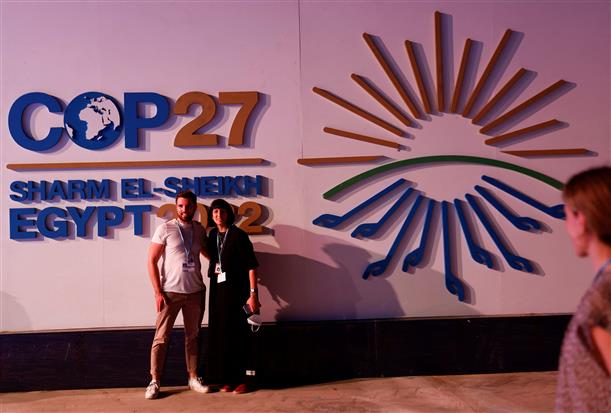Sharm el-Sheikh: World leaders are making the case for tougher action to tackle global warming Tuesday, as this year’s international climate talks in Egypt heard growing calls for fossil fuel companies to help pay for the damage they have helped cause to the planet.
United Nations chief Antonio Guterres warned Monday that humanity was on “a highway to climate hell with our foot on the accelerator,” urging countries to “cooperate or perish.” He and leaders such as Barbados Prime Minister Mia Mottley said it was time to make fossil fuel companies contribute to funds which would provide vulnerable countries with financial aid for the climate-related losses they are suffering.
The idea of a windfall tax on carbon profits has gained traction in recent months amid sky-high earnings for oil and gas majors even as consumers struggle to pay the cost of heating their homes and filling their cars.
For the first time, delegates at this year’s UN climate conference are to discuss demands by developing nations that the richest, most polluting countries pay compensation for damage wreaked on them by climate change, which in climate negotiations is called “loss and damage.” The US mid-term elections were hanging over the talks Tuesday, with many environmental campaigners worried that defeat for the Democrats could make it harder for President Joe Biden to pursue his ambitious climate agenda.
Also hanging over the conference was the fate of one of Egypt’s most prominent jailed pro-democracy activists, Alaa Abdel-Fattah, who has been imprisoned for most of the past decade.
His family stepped up pleas for world leaders to win his release after he stepped up a longtime hunger strike.
Abdel-Fattah stopped even drinking water on Sunday, the first day of the conference, vowing he is willing to die if not released, his family says.
Egypt’s longtime history of suppressing dissent has raised controversy over its hosting of the annual conference, known as COP 27, with many international climate activists complaining that restrictions by the host are quieting civil society.
On Tuesday, more world leaders were to take the stage, including Prime Minister Shahbaz Sharif of Pakistan, where summer floods caused at least $40 billion in damage and displaced millions of people.
After the speeches, the conference delegates will delve into negotiations on a range of issues — including for the first time on compensation, known as loss and damage.
Some of the strongest pleas for action came so far from leaders of poor nations that caused little of the pollution but often get a larger share of the weather-related damage.
Nigeria’s Environment Minister Mohammed Abdullahi called for wealthy nations to show “positive and affirmative” commitments to help countries hardest hit by climate change.
“Our priority is to be aggressive when it comes to climate funding to mitigate the challenges of loss and damage,” he said.
Leaders of poorer nations, joined by French President Emmanuel Macron, talked about the issue as one of justice and fairness.
“Our part of the world has to choose between life and death,” Tanzania President Samia Suluhu Hassan said.
“Africa should not pay for crimes they have not committed,” Central African Republic President Faustin Archange Touadera said, adding that rich nations were to blame for the climate problem.
“Climate change is directly threatening our people’s lives, health and future,” Kenyan President William K. Ruto said of the African continent, which he said is looking at $50 billion a year in climate change damage by 2050.
Ruto said Kenya is choosing to not use many of its “dirty energy” resources even though it could help the poor nation financially, and has instead opted for cleaner fuels.
Loss and damage “is our daily experience and the living nightmare of millions of Kenyans and hundreds of millions of Africans,” Ruto said.
Seychelles President Wavel John Charles Ramkalawan said, “Like other islands, our contribution in the destruction of the planet is minimal. Yet we suffer the most.” He called on wealthier countries to assist in repairing the damage.
Meanwhile, the mother of the Egyptian activist Abdel-Fattah, Laila Soueif, called for world leaders, including British Prime Minister Rishi Sunak, to pressure the Egyptian government to free him.
“The Egyptian authorities are your friends and proteges not your adversaries. If Alaa dies you too will have blood on your hands,” she said in a video message on Facebook.
Soueif, a university professor, said she waited Monday outside the prison where Abdel-Fattah is held for a letter, but received nothing.
She was planning to go to the prison Tuesday, hoping for proof her son is alive.
Abdel-Fattah’s youngest siter, Sanaa Seif, is in the resort town of Sharm el-Sheikh to raise the case of her brother and other jailed activists.
She is scheduled to speak about Egypt’s human rights record in an event along with the Secretary General of Amnesty International Agnes Callamard.
Sunak said he raised Abdel-Fattah’s case in his meeting Monday with Egyptian President Abdel-Fattah el-Sissi.
Sunak said he would continue to “press for progress” in Abdel-Fattah’s case, according to Downing Street.


